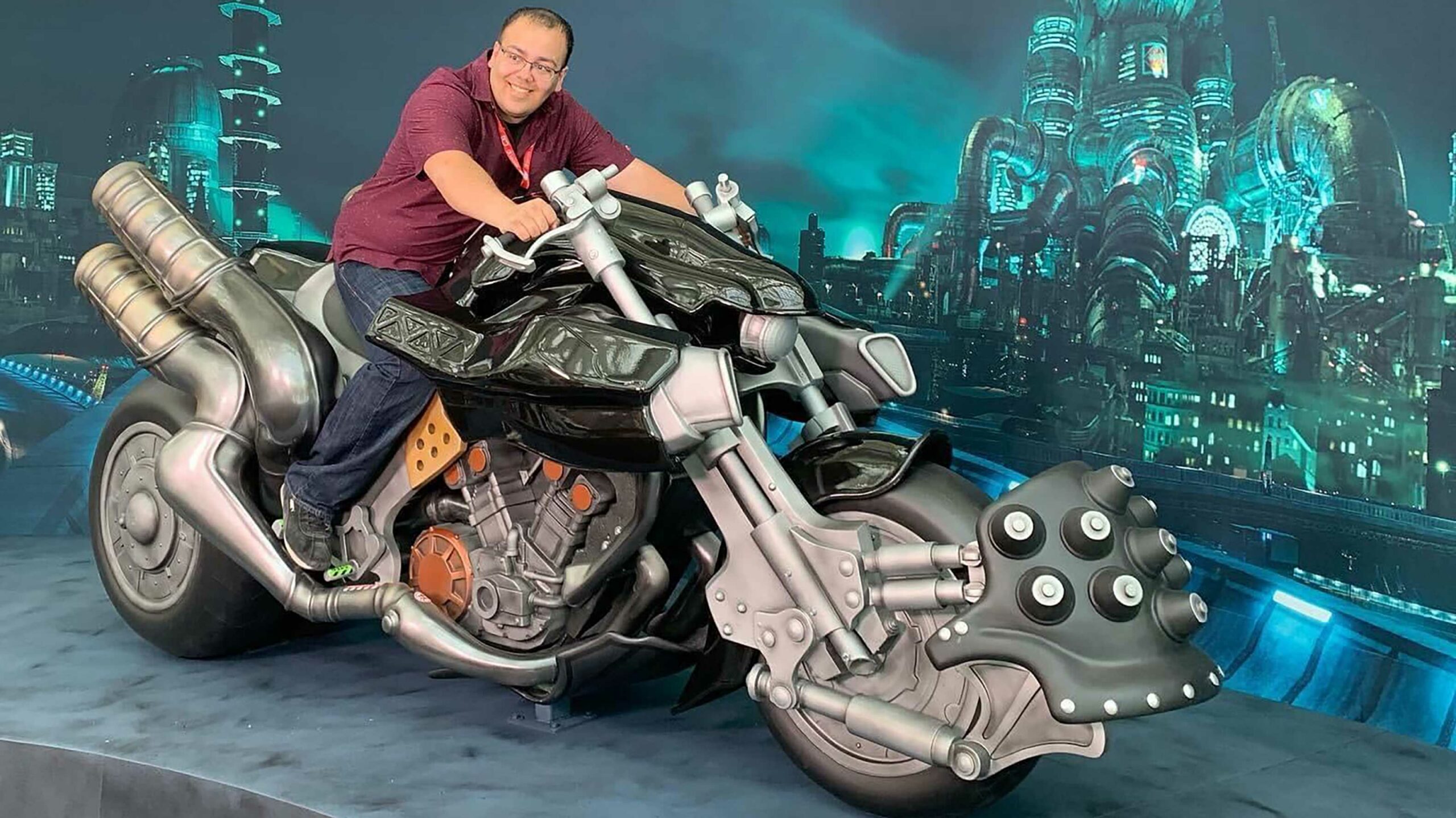
What does Final Fantasy VII mean to me?
That’s a question I’ve been mulling over ever since Square Enix posed it to the world. After all, it’s the 25th anniversary of the iconic Japanese role-playing game (JRPG) — what better time to reflect on my all-time favourite game?
Tell us what #FFVII means to you!
We want to hear how Final Fantasy VII was a part of your life over the last 25 years. Share your videos with us, using #WhatFFVIIMeansToMe.
Learn more: https://t.co/mgeiXr6YQd pic.twitter.com/rT8sAxxhpu
— FINAL FANTASY VII (@finalfantasyvii) July 7, 2022
On a surface level, it’s easy to see why Final Fantasy VII is so (rightfully) revered. It was a technical marvel upon its release in 1997, offering grand full motion video and 3D computer graphics that no prior game — Final Fantasy or otherwise — had featured. It told a deep, emotionally-charged narrative with themes of climate change, class warfare and mental illness that grow further relevant every day. It offered robust RPG mechanics in the form of a Materia system that let you intricately fine-tune each of your character’s abilities and specs. It features one of the all-time great gaming soundtracks, courtesy of legendary composer Nobuo Uematsu. It almost single-handedly sold the original PlayStation and helped popularize JRPGs — a then-niche genre — in the West.
But above all else, I cherish Final Fantasy VII because it helped me find myself. As they say, all good things come in threes, and so fittingly, the lessons I’ve learned from this game have been imparted upon me in three key periods of my life. What does Final Fantasy VII mean to me? Well, everything.
A journey of self-acceptance
At this point, most gamers probably have an idea of what FFVII is about, but here’s a brief synopsis for the uninitiated. Our story begins as Cloud Strife, a cold, aloof mercenary, joins a group of eco-terrorists called Avalanche to topple the Shinra Electric Power Company. During this quest, they learn of the return of Sephiroth, Cloud’s nemesis, whose mysterious plans put the entire planet at even greater risk.
It’s a riveting yarn filled with countless memorable moments, but its most famous, by far, is when Sephiroth kills Aerith. It was tremendously affecting; the kind-hearted flower girl is taken so soon, robbing you, the player, of both her infectiously warm presence and ever-handy healing abilities. I remember spending ages running around the Midgar Slums, desperate to find a way to bring her back — an effective way to teach a young kid about the impermanence of life.
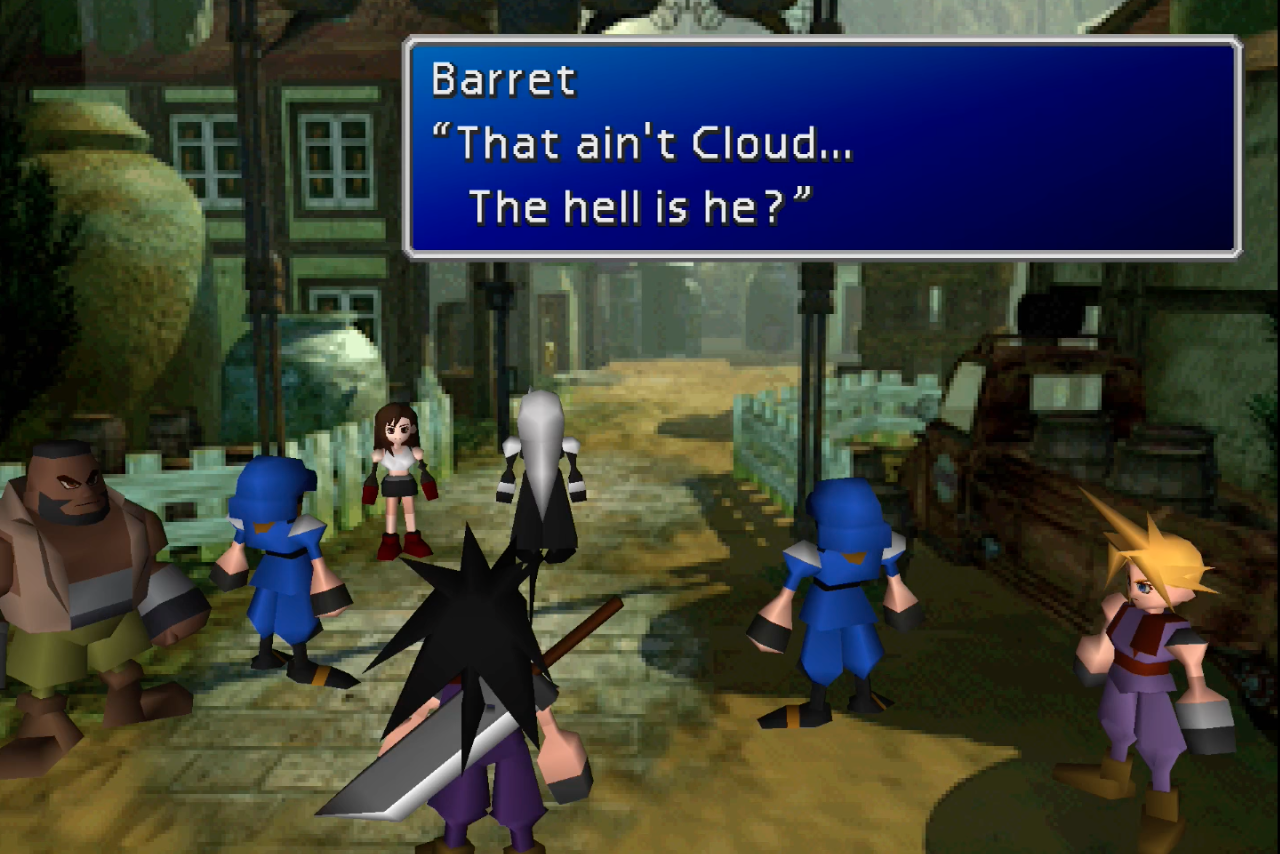 But for me, the bigger and more impactful twist came just a bit later, in the Northern Cave at the start of Disc 2. After mostly dealing with Sephiroth’s minions up until this point, we find the villain sleeping cozily in a creepy cocoon. As it turns out, everything that’s happened has been Sephiroth manipulating the party to get to that point. The coup de grâce? He reveals that Cloud isn’t the renowned SOLDIER hero he claimed to be — he was a simple Shinra infantryman who never made it into SOLDIER. Worse still, Shinra scientist Hojo had experimented on Cloud in an effort to turn him into a loyal Sephiroth clone, and he even proved a failure at that. All of that trauma caused Cloud to snap, assuming an identity that was formed by stories he’d heard from his best friend, Zack, an actual top-ranking SOLDIER.
But for me, the bigger and more impactful twist came just a bit later, in the Northern Cave at the start of Disc 2. After mostly dealing with Sephiroth’s minions up until this point, we find the villain sleeping cozily in a creepy cocoon. As it turns out, everything that’s happened has been Sephiroth manipulating the party to get to that point. The coup de grâce? He reveals that Cloud isn’t the renowned SOLDIER hero he claimed to be — he was a simple Shinra infantryman who never made it into SOLDIER. Worse still, Shinra scientist Hojo had experimented on Cloud in an effort to turn him into a loyal Sephiroth clone, and he even proved a failure at that. All of that trauma caused Cloud to snap, assuming an identity that was formed by stories he’d heard from his best friend, Zack, an actual top-ranking SOLDIER.
It was an earth-shattering revelation for 10-year-old Brad. Our hero lied to us? I questioned everything I knew! And even in the years since, this “unreliable narrator” twist has remained remarkably novel in the video game space, making me appreciate it all the more. What follows, though, is even more painful to watch. We next find Cloud in a comatose state, suffering from intense sickness and the soul-crushing revelation he just experienced. Simply put, he’s utterly broken. Tifa, distraught by what’s happened to her childhood friend, opts to stay with him in the hospital in hopes that he’ll recover. Through some convenient spiritual magic, Tifa’s eventually able to enter Cloud’s subconscious and help him piece together who he really is. It turns out, he was a sad, lonely little boy who pined for Tifa, a popular girl in their hometown. When she nearly died in an accident with Cloud, the townspeople wrongfully blame him, leading the sullen youth to desperately want to leave home, join SOLDIER and become strong.
Now, Cloud’s story hit so hard because it related so heavily to my own. Those who follow MobileSyrup might remember that when Kingdom Hearts‘ Sora was revealed for Super Smash Bros. Ultimate last year, I wrote about why that meant a lot to me. In that piece, I focused on my best friend growing up, who was everything I wanted to be. I was pudgy, short, shy and awkward; my friend was lean, tall, confident and outgoing. He had a girlfriend and knew karate; I was single and could barely kick a soccer ball without falling on my face.
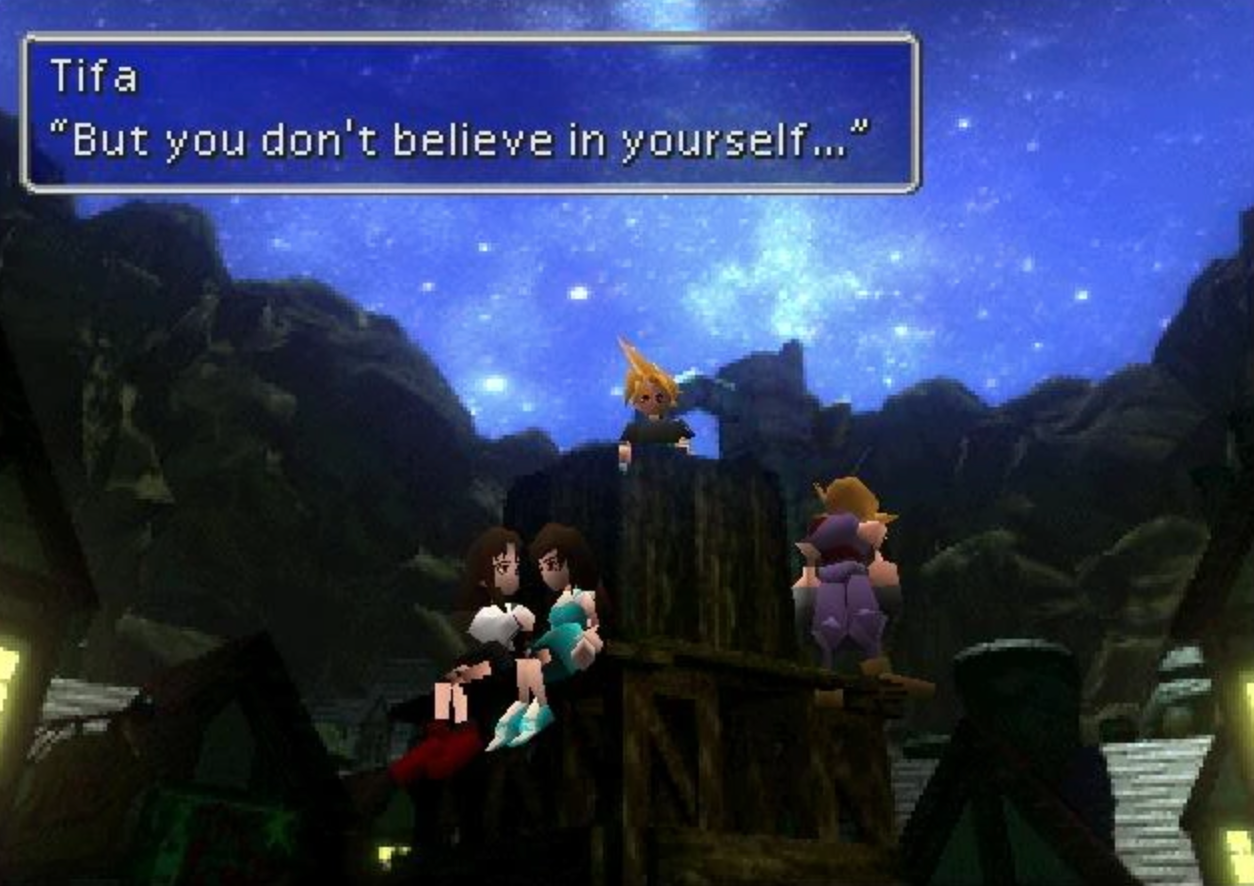 That same friend is the one who loaned me FFVII, which gave it special significance before I even played it. But beyond that, my friend, in many ways, was the “Zack” to my “Cloud” — the person I wished I could see myself as. Underneath Cloud’s badass swordsman exterior lay a deeply insecure loner. Like me, Cloud also was raised by a single mother, except in his case, his father had died, whereas mine was just an emotionally abusive, distant asshole. As someone who’s struggled with confidence and social interaction, I felt seen. We learn that when Cloud once returned home, he felt so embarrassed that he never made SOLDIER that he hid his identity so as to not be recognized by Tifa and everyone else. As a kid who would always nervously slink into a corner to fade away, I understood Cloud’s pain.
That same friend is the one who loaned me FFVII, which gave it special significance before I even played it. But beyond that, my friend, in many ways, was the “Zack” to my “Cloud” — the person I wished I could see myself as. Underneath Cloud’s badass swordsman exterior lay a deeply insecure loner. Like me, Cloud also was raised by a single mother, except in his case, his father had died, whereas mine was just an emotionally abusive, distant asshole. As someone who’s struggled with confidence and social interaction, I felt seen. We learn that when Cloud once returned home, he felt so embarrassed that he never made SOLDIER that he hid his identity so as to not be recognized by Tifa and everyone else. As a kid who would always nervously slink into a corner to fade away, I understood Cloud’s pain.
Eventually, Tifa is able to help Cloud finally discover who he really is. Crucially, she shows Cloud that regardless of what he or anyone else thought of him, he still saved the day — not as SOLDIER, but as Cloud. When Sephiroth burned down their hometown and nearly killed Tifa, it wasn’t Zack who stopped him — it was Cloud. Because he pushed through his fears and uncertainties to be there for her when she needed him most. That’s what she cared about, not that he didn’t make SOLDIER.
Later, in the party’s airship, The Highwind, Cloud comes clean to the team. “The combination of Jenova cells, Sephiroth’s strong will, and my own weaknesses are what created me. Everyone knew that,” he says. “I’m… Cloud. The master of my own illusionary world. But I can’t remain trapped in an illusion anymore… I’m going to live my life without pretending.” As he says this, the rousing, triumphant Highwind theme starts playing. Accepting their leader for who is and filled with a renewed sense of purpose, the party then excitedly leaves the room. Cloud, now alone, does a big stretch, a huge weight has been lifted off his shoulders. He’s not Zack, nor is he Sephiroth; he’s Cloud, and that’s okay. Final Fantasy VII wasn’t afraid to show us a hero who was deeply flawed. Sure, he could swing a sword like no other on the battlefield, but we also got to see him at his most achingly vulnerable and lonely.
It’s difficult to overstate how significant this all was for me. Growing up, I was often told to be one thing or another. When I did see him, my father would yell at me for being overweight and timid. His devout Hindu parents berated for me reading fiction books instead of the Bhagavad Gita. Kids at school would make fun of me for being nerdy. Even with a loving and supportive maternal family, that repeated external pressure to conform was a lot. And as a mixed kid, torn between two different cultures and ideologies and not looking quite like most my age, I felt like an outsider, just like Cloud. When my best friend moved far away, it felt like I lost the one person who fully understood me.
So, to see Cloud work through a similar identity crisis and come out all the better for it was powerful. He becomes more open about his emotions, like when he admits he’s anxious during a stressful moment in a submarine. He’s more conscious of his teammates, encouraging them before the final battle to leave the airship to reinforce what they’re fighting for, but also saying he fully understands if they choose not to return. He drops the cool front and says corny things like “let’s mosey!” — a good reminder to the player that despite how cool he looks, he’s still just a big dork like many of us. And as a brilliant marriage of narrative and gameplay, the final fight of the game with Sephiroth is an unlosable one, illustrating in a unique way, how much Cloud how has grown.
All of this showed me the importance of staying true to yourself. By doing so, Cloud discovered his own self-worth and, by extension, the enduring loyalty of his friends. In turn, I learned to accept myself for who I am, not what I thought or was told I should be. It didn’t matter if I had the recognition of many, as long as I had the love of a few. What my friends and family valued in me — my honesty, loyalty and genuine desire to do good — was what mattered. This was an essential truth to learn when I was younger, and it’s even more relevant today. Often, I’ll see people making disingenuine social media posts for cheap engagement. People care more about clout, like Cloud did, then earnestness. I even drifted apart from my best friend in high school because he turned into a completely different person in a disappointing effort to become more popular. There are few things more important than sincerity, and I have Final Fantasy VII to thank for teaching me that.
Have a little faith
I have a complicated relationship with religion.
As I alluded to before, my paternal grandparents are hardcore Hindu — the sort that wakes up at 3am to pray, constantly preaches to everyone and frowns upon family doing pretty much anything that could, you know, be perceived as fun. That wouldn’t be nearly as bad if it didn’t come laden with hypocrisy. At the same time I was told that meat-eating, gambling and leather-seated cars were wrong, I would see this same family… eating meat, gambling and rocking cars with leather seats. Hell, my dad would literally take me to Burger King, get me a burger without the patty, tell the guy working there that we shouldn’t be eating meat, and then order a chicken sandwich anyway. This “do as I say, not as I do” mentality was enough to make me pretty jaded at an early age. For a while, I couldn’t understand why anyone, outside of those being forced into it like I was, would even bother with religion.
But then I played Final Fantasy VII, and I began to open my mind. When you boil it down, pretty much any work of art has a theme of “life,” but FFVII took that concept to a level I had never seen in a game. Several hours into the game, the party stops at Cosmo Canyon, the home of party member Red XIII. Here, we meet Bugenhagen, Red’s grandfather, who explains the Lifestream, an ethereal substance that keeps the planet alive. When people die, they join the Lifestream, creating Spirit Energy which, in turn, fuels the birth of new life.
When I first watched this scene in Bugenhagen’s observatory, I was stunned. A video game espousing profound spirituality, with similarities to the Hindu teachings I’d been made to sit through and had come to resent? (Not to mention, as an adult, discovering all of the other religions that the game has drawn inspiration from.) To find such beauty in something I had once held in disdain! And that was even before I learned that creator Hironobu Sakaguchi, who co-wrote the story of FFVII, dreamed up the Lifestream as “a mathematical and logical way” of dealing with the untimely passing of his mother. Therefore, I started to view religion differently, a feeling that was further validated as I made friends who were Christian, Jewish and Muslim, who all had healthy, lovely relationships with their respective faiths. Although I still didn’t love the role it played in my family, I could finally understand what it meant for others.
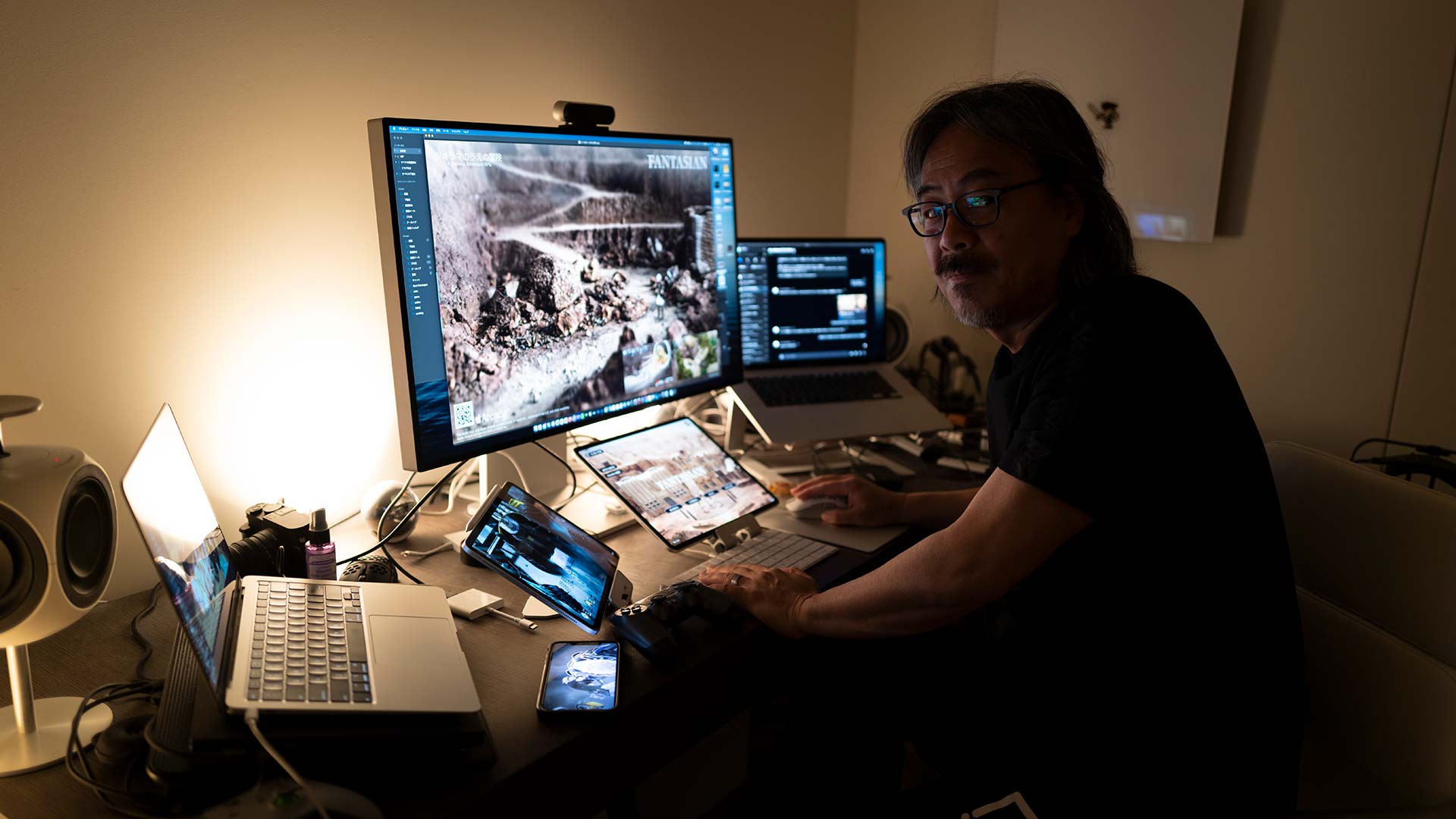
Hironobu Sakaguchi, the creator of Final Fantasy. Image credit: Apple
All of that’s proven even more poignant now as I’ve been putting this piece together. Earlier this week, a close friend’s sister passed away from an aneurysm. After spending six days listening to him vent — desperately trying to give him some hope that she’d pull through in the hospital — she’s now officially gone. I can’t even imagine how he feels, and my heart breaks not only for him, his parents and his brother-in-law, but also for his young niece and nephew, who will now grow up without a mother. Such a sudden death can no doubt be difficult to process. How do you make sense of it?
While I now identify as agnostic, there’s still a part of me that hopes something like the Lifestream could exist. Some level of comfort, however small, can be found in the belief that the lives that are lost — especially young and innocent ones like his sister — are given some sort of afterlife. Incidentally, my friend’s family is Buddhist, so they’ll no doubt have their own takes on reincarnation.) Knowing Sakaguchi’s inspirations for the Lifestream, and seeing how they could apply to what my friend is going through, adds deeper meaning to FFVII‘s themes for me, even all these years later. Amid all the horrible trials of life that so many people go through, I now see how religious beliefs can provide solace, and I credit VII for helping to make me be just that little bit more empathetic.
Embrace your dreams
After everything I’ve said about Cloud, you’d think he’d be my favourite FFVII character. But actually, it’s Zack. Not in the original game, mind you — he barely has any screentime there, and the pivotal flashback scene in which he dies is, oddly, completely missable! No, I’m talking about the prequel game Crisis Core: Final Fantasy VII, in which Zack is the lead.
Simply put, Crisis Core itself came at the perfect time for me — March 2008, when I was 13 and just a few months away from ninth grade. That’s a critical time in one’s life. Puberty, teenaged angst, the dread of starting high school… all of it. I needed a big game to dive into, and there FFVII was again.
On the one hand, I shouldn’t have been surprised that I ended up liking Zack. After all, he does remind me a lot of my childhood best friend. But what I couldn’t have foreseen is how impactful his story would end up being. Zack’s arc is, ostensibly, the inverse of Cloud’s; he starts off overly energetic and becomes more serious over time. Totally understandable — by the end of the game, his good friend Sephiroth had a heroic fall and Shinra, the company he gave his life to, begins hunting him down. But throughout all of this adversity, Zack kept reminding himself of his aspirations. His personal mantra, “embrace your dreams,” was what helped him pull through — in this case, dreams of becoming a hero.
In the end, the Shinra army catches up with him, and after an incredibly grueling battle and heartwrenching farewell scene with Cloud, he succumbs to his injuries. But my biggest takeaway, in between balling at what I had just seen, was that amid everything he’d gone through, Zack still held onto his dreams. Despite a literal army at his heels, he stopped to save both a wounded Cloud and a former SOLDIER named Genesis, who Shinra had left to die. Because of this, he never got the happy ending with Aerith that he’d hoped for, but he did fulfill his dreams. In the end, he became a hero. Does that sound like a cheesy anime plot? Sure! But it’s what 13-year-old Brad needed to see. Zack’s story, so intrinsically tied to Cloud’s, had recontextualized my favourite game. Knowing the sacrifice that ensured Cloud would live added deeper meaning to everything that he later went through.
More importantly, though, it proved inspirational. That “embrace your dreams” quote is one that’s stuck with me ever since. As someone who’s always enjoyed reading and writing, I’d always thought turning that into a job would be pretty swell. Then high school comes along and we’re rather quickly pushed to make educational decisions that will lead us down a career path and shape the rest of our lives. At this time, I looked around and saw seemingly all of my peers turn to engineering or some other similar field, and I thought that I maybe should do that, too, even though I’d never been good at math or science. Ultimately, I ended up taking a gap year to figure things out, which included a failed exchange program attempt and a stint at FutureShop, where I’d meet many good friends, including the one whose sister just passed, and come out of my shell a bit.
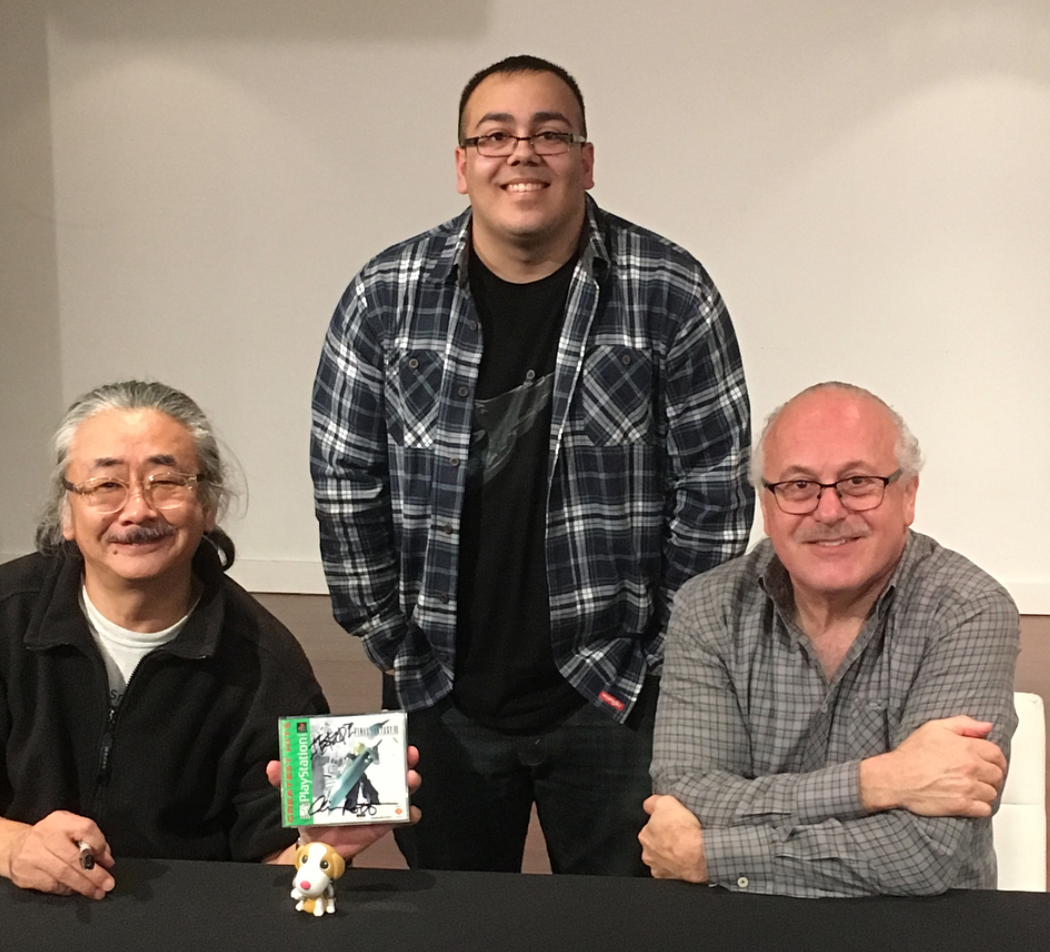
The music of Nobuo Uematsu has been so important in my life, so you can imagine how much I freaked out after meeting him in my graduating year.
And throughout all of this, I kept hearing that damned quote in the back of my head. “Embrace your dreams.” After many hours in deep thought at the local library, including reading an eye-opening Official Xbox Magazine piece about how writers with journalism backgrounds could break into the industry, I got a crazy thought. “What if you pursued journalism? Honed your writing skills so you could eventually use them to pursue something related to gaming?” Months later, I applied to Ryerson Toronto Metropolitan University, one of Canada’s top journalism schools, thinking it was a long shot. To my surprise, I got accepted and, after a four-year program, got this job at MobileSyrup right after graduating. In the five years since, I’ve gotten to realize many lifelong dreams, including going to E3 and interviewing Hironobu Sakaguchi himself. I still pinch myself that I was able to speak with him.
It’s been a wild, satisfying ride, and it’s all because I listened to this spiky-haired fictional character. Not bad, huh?
On Our Way
It’s not an understatement to say that Final Fantasy VII changed my life. When I was 10, it taught me the value of accepting myself for who I am. In the following few years, it taught me to accept others for who they are. And during my teens, it taught me the importance of always pursuing your dreams.
If that weren’t enough, VII has remained a steady source of joy. I make a point of replaying it almost every year, reminding myself of all the memories and life lessons that have come about from it. It’s like a warm blanket. When I’m not playing the game, I regularly turn to Nobuo Uematsu’s majestic music, which never ceases to genuinely move me. The soundtrack has many beautiful pieces, but “Main Theme of Final Fantasy VII” has provided so much comfort in my darkest moments — I hold it very dear) And now, with the ongoing Final Fantasy VII Remake trilogy, I get to experience fresh adventures with Cloud and the gang — basically old friends at this point — for years to come.
At every point in my life, Final Fantasy VII has been there for me, and I’ll always love it for that.
MobileSyrup may earn a commission from purchases made via our links, which helps fund the journalism we provide free on our website. These links do not influence our editorial content. Support us here.


